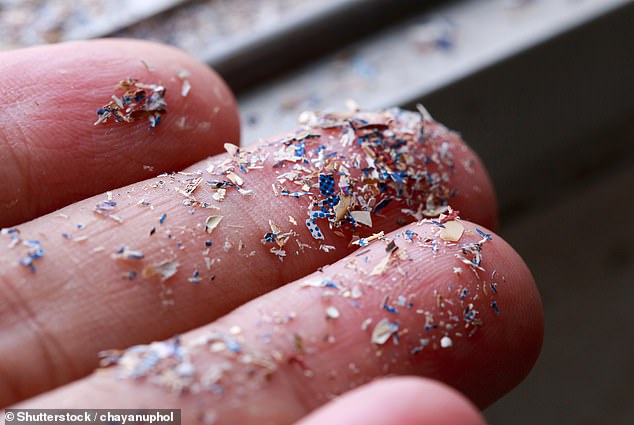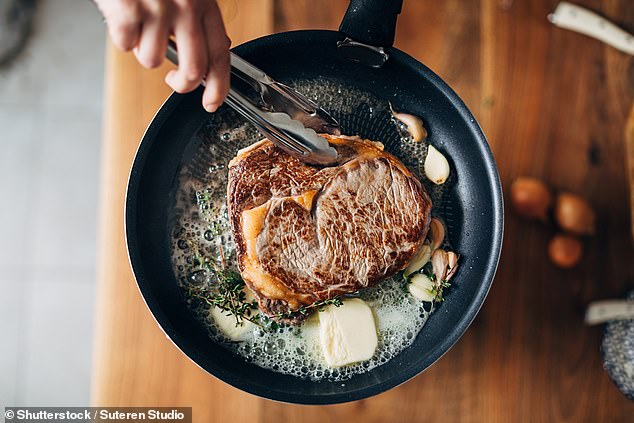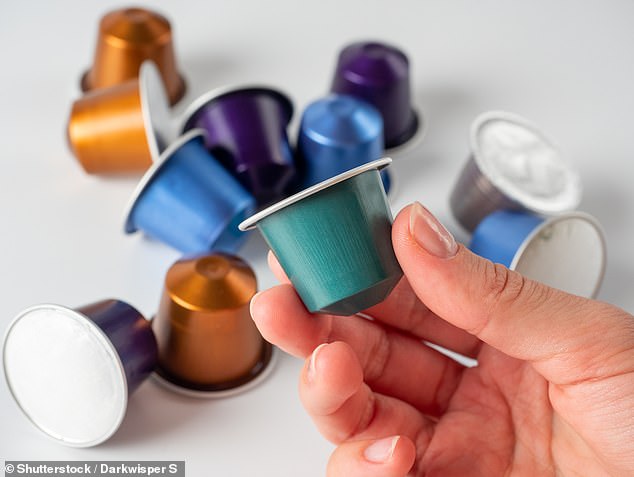Doctor reveals essential items he has banned from his kitchen because they leach cancer-causing microplastics
You almost certainly have one, if not more, at home.
But a doctor is urging people to throw away essential items in their kitchen due to its increasing link with cancer.
Research increasingly shows that microplastics – microscopic compounds secreted by larger plastic objects – enter our blood, accumulate in our organs and cause untold damage.
They leach into the food we eat, the water we drink and the air we breathe and have been linked to heart disease, dementia and several forms of cancer.
Dr. Joseph Mercola, an osteopathic family medicine physician and author of Your Guide to Cellular Health, told DailyMail.com that many of the products responsible for this cascade of health problems can be found in your kitchen.
He said: ‘Many common kitchen items you use every day contain or release microplastics during the preparation and consumption of food.’
Dr. Mercola first pointed out the obvious: nonstick cookware and plastic cutlery. They pose a risk because of their close contact with the food we eat, and constant exposure to heat accelerates their decomposition.
Black plastic kitchen utensils in particular appear to contain the highest concentrations of toxic chemicals.
But Dr. Mercola points out other essentials, such as plastic cutting boards, Tupperware, coffee and tea pods and salt and pepper mills.
Dr. Joseph Mercola (pictured here), a family medicine physician, osteopathic physician and author of Your Guide to Cellular Health, told DailyMail.com that he avoids non-stick pans, coffee pods and spice grinders to reduce exposure to harmful microplastics

Microplastics are tiny pieces of plastic that end up in food, water and the air from products such as non-stick pans, clothing and children’s toys
He advises switching to a wooden cutting board to prevent hormone-disrupting microplastics from ending up in meat and vegetables.
And he recommends people opt for loose ground coffee and spices to reduce unnecessary plastic from grinders and coffee machines.
Dr. Mercola said: ‘Microplastics pose a significant risk to your health in the long term because they contain endocrine disrupting chemicals (EDCs).
‘These chemicals mimic estrogen and have been linked to infertility and hormone-induced cancers.
‘Research shows that once you swallow or inhale microplastics, they can build up in your tissues, causing chronic inflammation and an increased risk of heart attacks and strokes.’
The increased prevalence of EDCs is seen as a possible cause of the US fertility crisis.
This has largely been observed with phthalates, which are added to plastics such as food storage containers to make them pliable and soft.
One study in the journal Toxicological SciencesFor example, they found that female mice exposed in the womb to the same phthalate mixtures found in pregnant women were born with fertility problems, which they then passed on to their female offspring.
Additional research has found that higher levels of phthalates in women’s urine can reduce the chance of pregnancy and increase the risk of pregnancy loss before the 20th week of pregnancy.
A survey in the journal Breast cancer research also found that higher urinary phthalate levels were associated with an up to 32 percent increased risk of breast hormone receptor-positive breast cancer.
Meanwhile, a Polish study showed that phthalate exposure in men reduced the quality of their semen and sperm count, reducing the chance of pregnancy.
To reduce exposure to phthalates, Dr. Mercola suggests switching to storage containers made of glass, which are nonporous and prevent chemicals from leaching into food.
Dr. Mercola also pointed to nonstick pots and pans, which are often coated with Teflon.

Microplastics used in non-stick cookware have been shown to increase the risk of certain cancers and thyroid diseases

Some coffee pods, Dr. Mercola warned, are made with polypropylene #5, which has been linked to reports of asthma
Teflon, also known as polytetrafluoroethylene (PTFE), is used to repel water and oil and prevent food from sticking to the surface.
Although Teflon is not considered a carcinogen, some studies have raised concerns about perfluorooctanoic acid (PFOA), a chemical previously used to produce Teflon.
PFOA is considered a per- and polyfluoroalkyl substance (PFAS), also called a “forever chemical,” meaning it does not break down in the environment.
PFAS have been linked to an increased risk of cancer, thyroid disease and high cholesterol.
Dr. Mercola said, “You could replace nonstick cookware with ceramic or stainless steel pots and pans.”
He also noted that toxic chemicals can even end up in your morning cup of tea or coffee.
For example, Keurig K-Cups are made from polypropylene #5, a synthetic polymer derived from the fossil fuel petroleum.
Although polypropylene #5 is considered one of the safest microplastics, some research has suggested that overexposure could infiltrate the lungs and lead to asthma.
Dr. Mercola said these plastics have also been found in some tea bags.
A Study from 2024 in the journal Chemosphere found that brewing tea with a bag made of polypropylene #5 released 1.2 billion pieces of plastic per milliliter of tea.
If you need a caffeine boost in the morning, Dr. Mercola suggested using loose coffee grounds or loose tea instead of opting for pods or tea bags.
Herbs with built-in grinders are also on Dr. Mercola’s chopping block.
He said: ‘Spice grinders made from polymers such as POM (polyoxymethylene), PS (polystyrene) and PMMA (polymethyl methacrylate) have been shown to deposit microplastic particles in the ground spices, while POM-based grinders result in the highest levels of contamination. ‘
When heated to high temperatures, POM is associated with respiratory problems.
Dr. Mercola suggests purchasing herbs stored in glass containers that do not have built-in plastic grinders.
